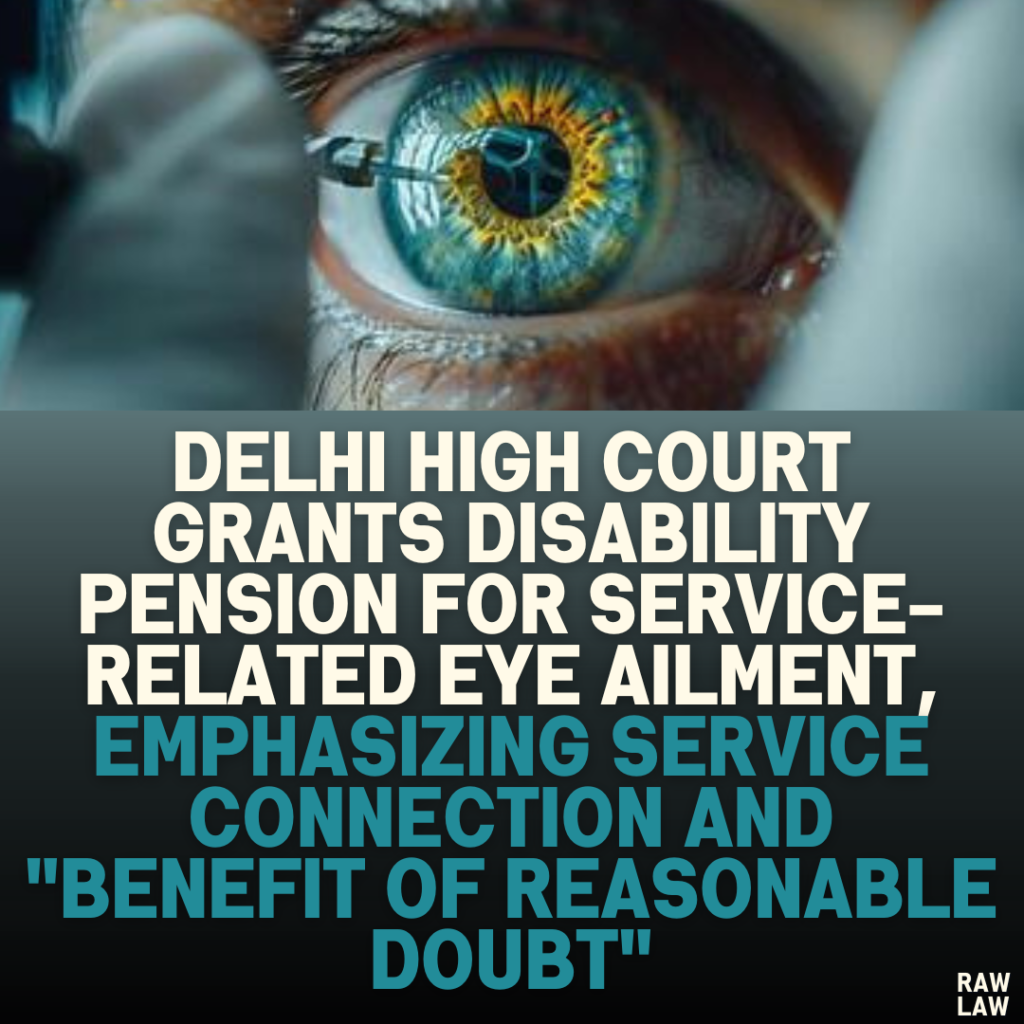Court’s Decision:
The Delhi High Court directed the CRPF to grant disability pension to the petitioner, who suffered from corneal opacity during his service. The court held that in the absence of reasons negating the disability’s connection to service, it must be presumed attributable to or aggravated by service conditions. The disability, initially assessed at 40%, was directed to be rounded off to 50%, with arrears paid from three years before the petition’s filing.
Facts:
- Joining the CRPF: The petitioner joined the CRPF as a Constable/Driver on April 5, 1995. At the time of induction, he was declared medically fit.
- Development of Ailment:
- In 1999, while serving in Imphal, he developed a corneal ulcer in his left eye, leading to impaired vision.
- He underwent treatments, including a failed surgery, but his condition did not improve.
- Medical Board Recommendations:
- In 2003, a Departmental Rehabilitation Board found him fit only for light duties and recommended periodic reviews.
- By 2010, the petitioner was declared permanently incapacitated for any service due to “corneal opacity with failed penetrating keratoplasty.” His disability was assessed at 40%.
- Invalidation from Service:
- The petitioner was invalidated from service on April 21, 2010, despite requesting an extension to complete 20 years of service for full pension eligibility.
- Denial of Disability Pension:
- Multiple requests for disability pension were denied, prompting the petitioner to approach the court under Article 226 of the Constitution.
Issues:
- Was the petitioner’s disability attributable to or aggravated by service conditions?
- Was the petitioner entitled to disability pension and its subsequent rounding off under the applicable rules?
Petitioner’s Arguments:
- Service Connection: The petitioner argued that since no medical issues were reported at the time of joining, the disability, which developed during his service, must be presumed attributable to or aggravated by service.
- Violation of Natural Justice: The denial of disability pension without justifiable reasons was arbitrary and contrary to established principles.
- Precedents:
- Cited cases such as Union of India v. Rajbir Singh and Mohan Lal v. Union of India, which established the presumption of service connection in disability cases.
Respondent’s Arguments:
- Alternative Benefits Provided: The respondents argued that the petitioner had already been granted invalidation pension under the Central Civil Services (CCS) Rules.
- Non-Attributability of Disability: They claimed the petitioner’s ailment was not connected to or aggravated by his service, as it did not result from service conditions or the work environment.
- Compliance with Rules: The respondents asserted that the petitioner’s case was processed under the applicable rules, including the CCS (Extraordinary Pension) Rules.
Analysis of the Law:
- Central Civil Services (CCS) Rules:
- Rule 2 of the CCS (Extraordinary Pension) Rules specifies that in deciding attributability, all evidence, both direct and circumstantial, must be considered.
- The rule emphasizes granting the “benefit of reasonable doubt” to claimants, particularly those serving in field conditions.
- Liberal Interpretation for Personnel: The court highlighted that in cases of doubt, the presumption should favor the personnel, especially when no contrary evidence is provided by the respondents.
- Absence of Reasons: The Medical Board and respondents failed to specify why the petitioner’s disability was not attributable to or aggravated by service, a critical factor in denying disability pension.
Precedent Analysis:
- Mohan Lal v. Union of India:
- The court ruled that if a Medical Board fails to record reasons for the denial of attributability, the ailment must be presumed connected to service.
- Union of India v. Rajbir Singh:
- The Supreme Court emphasized a liberal interpretation of pension rules, favoring service personnel, particularly in disability-related claims.
- Dharamvir Singh v. Union of India:
- Established that disabilities arising during service should be presumed to be attributable to or aggravated by service unless proven otherwise.
Court’s Reasoning:
- Attributability of Disability:
- The petitioner was fit at the time of joining the CRPF, and his disability arose during service. No evidence was presented to disprove its connection to service conditions.
- Failure of the Respondents:
- The respondents failed to provide reasons for denying the disability’s attributability, which is a violation of established legal principles.
- Applicability of Rules:
- The court observed that Rule 5(i) of the Government of India’s Decisions under the CCS (Extraordinary Pension) Rules mandates rounding off disabilities assessed below 50% to 50%.
Conclusion:
The court allowed the petition and directed:
- Granting of disability pension, with the disability percentage rounded off to 50%.
- Payment of arrears from three years before the filing of the petition.
- Release of pensionary benefits within two months.
Implications:
- Strengthens Rights of Personnel: This judgment reaffirms the principle that service-related disabilities are entitled to liberal interpretation under pension rules.
- Promotes Accountability: Establishes that authorities must provide specific reasons when denying disability claims.
- Protective Precedent: The case will likely influence similar disputes, ensuring equitable treatment for service personnel.




Pingback: Supreme Court: Wife’s Justified Refusal to Return Despite Restitution Decree Does Not Bar Maintenance Under Section 125(4) Cr.P.C.; ₹10,000 Monthly Award Reinstated - Raw Law